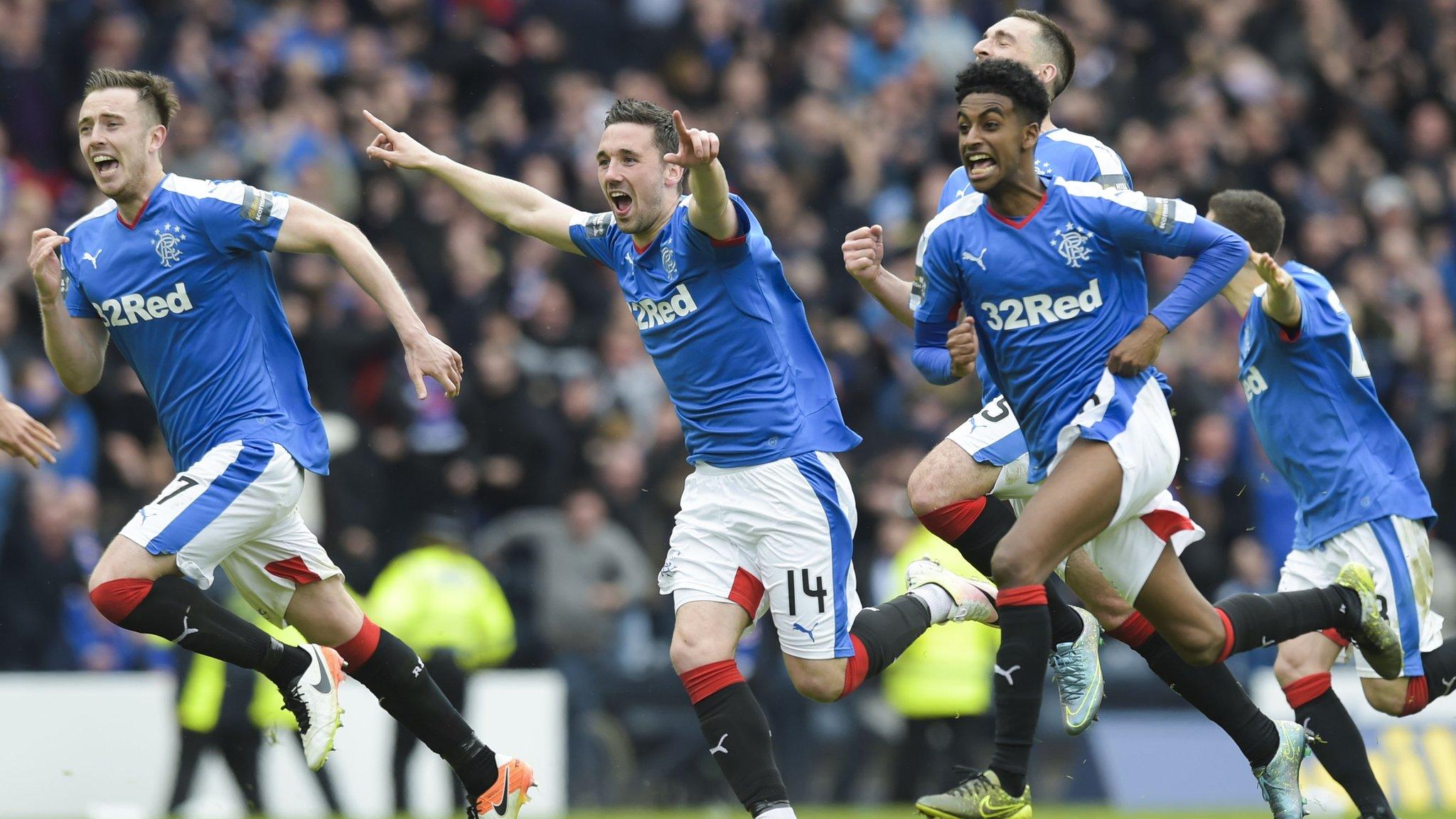Scottish Cup semi-final: Rangers in delirium, Celtic in purgatory
- Published
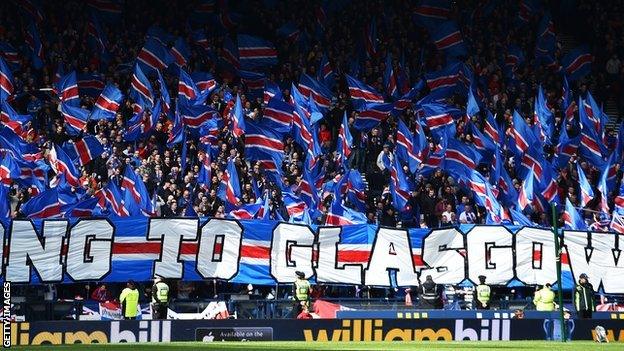
Rangers prevailed in the Scottish Cup semi-final over Celtic
As Andy Halliday walked to the penalty spot to begin the shootout, Mark Warburton detached himself from his coaching staff on the touchline at Hampden and found a little oasis a few yards away.
There he stood for the most part, occasionally joined by his assistant, Davie Weir, but principally alone in his own thoughts as Halliday scored and James Tavernier missed, as Barrie McKay scored and Nicky Clark missed, as Lee Wallace and Gedion Zelalem gave his team match-point, both of them saved by Celtic.
It was only when Tom Rogic missed that last kick that Warburton showed much emotion. He celebrated, but not wildly and not for long. If he was composed in his moment of glory then he was merely mirroring his players; underdogs who relished the occasion and seized it against the odds.
There will be introspection and recrimination at Celtic. There'll surely also be a metaphorical head on a spike within weeks. Ronny Deila had to win this semi-final, simply had to. There were too many grave doubts circling around his head before this and now those doubts will have hardened into anger and bitterness at a grievous loss to their oldest enemy.
It was a weakened enemy, not that you would know it. Rangers were stripped of their chief goalscorer, Martyn Waghorn, their most expensive signing, Michael O'Halloran, their in-form wide man, Harry Forrester, and another wide man, Billy King.
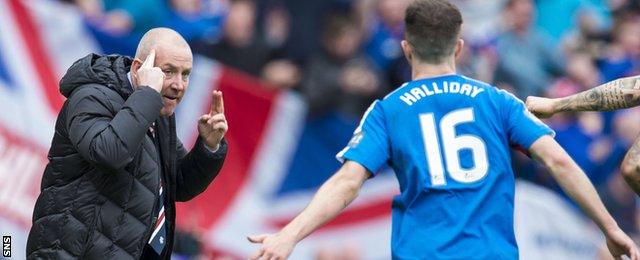
Mark Warburton (left) urges his men on despite taking the lead
Still they prevailed. Celtic had Kris Commons on the bench, an unused substitute. They had Scott Allan and Ryan Christie sitting in the stand, or at home, or on a beach. Wherever they were, they weren't in the squad. Both of those promising players are lost, back-sliding into anonymity and irrelevance since their move to Celtic Park. Wasted talents.
Rangers' squad is tighter, better utilised and more driven. They had, in Halliday, a midfield player that made Scott Brown look like the light of other days. They had, in Barrie McKay, a terrific influence who had done enough to win man of the match even before he launched a rocket into Craig Gordon's goal in that dramatic extra-time period.
McKay was bright, intelligent, hungry for the ball and dangerous with it. We have spent so much time this season talking about Celtic's battalion of midfielders and what on earth Deila is supposed to do with them all, but McKay, and chums, trumped the lot of them.
If a stranger was told before kick-off that there was a £12m player on the park he would have pointed at McKay at game's end, not Patrick Roberts or any of the hype machines - Nir Bitton - around and about him.
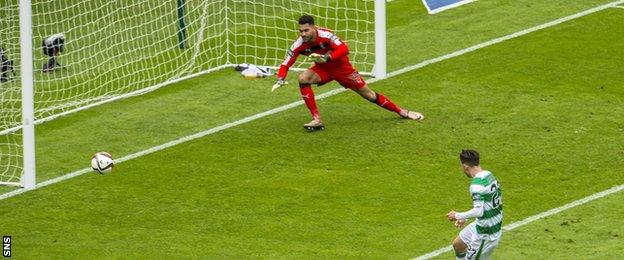
A pivotal moment came when Partick Roberts missed after Leigh Griffiths had hit the post
The day began with smoke bombs and ended in distress flares being fired out of the Celtic camp. They went behind through Kenny Miller's goal from an error by Brown, the diminished leader.
You can call Miller evergreen; the colour might be wrong, but not the sentiment. That goal came in the 16th minute and it was a thunderclap in Celtic's ears. Any thought that Rangers might be out-classed by the Premiership champions had more or less gone out of the window even at that early stage.
They had an appetite for work that out-did Celtic's. They had a composure in possession that was better, a desire to throw themselves in front of things when it was needed.
It was a small moment in what was a tumultuous semi-final, but it was instructive all the same. In the 17th minute, Roberts shaped to shoot inside the Rangers penalty area. In that second, his path to goal looked clear.
Just as he pulled the trigger, two Rangers men hurled themselves in the path of the ball and blocked the shot. That happened more than once. There were doubts about this Rangers defence - many of them expressed in this space - but when they weren't defending wisely they were defending bravely. They wanted it. Massively.
Celtic were hustled and harried. They looked, at times, like a team that weren't prepared for a dogfight. When they made a chance, they blew it. Roberts put his sitter wide - a miss of the ages - Iwelumoesque.
They did equalise, early in the second half, and it was a fine goal from Erik Sviatchenko. Celtic might have thought that it was a goal to restore what they would hoped be the natural order of things, a precursor for dominance. It wasn't.
Rangers composed themselves after 15 hairy minutes and entered extra-time feeling good about their chances. Even if defeat had come at that point they had done their job, they had proven that they could go toe-to-toe with Celtic and not give an inch.
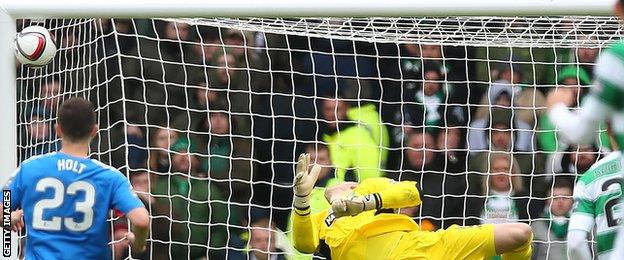
Goalkeeper Craig Gordon can only watch as Barrie McKay's effort hits the net
An inch? Instead they scored from a mile. At the time, the Celtic management complained about the awarding of a throw-in Rangers' way on the touchline, but that was more than 40 yards from Celtic's goal. No excuses.
McKay's hit was hard and true, rising as it hit Gordon's net and nestling in full view of the Celtic support behind. Another kick to their solar-plexus.
Celtic came again and the second spell of extra-time was an epic unto itself. Kieran Tierney, who manned-up to the challenge better than any one of his team-mates, pulled a ball back for Rogic who levelled it. Drama upon drama.
And, of course, we weren't done. Rogic had a chance, but Wes Foderingham saved. Players - Celtic players mostly - were showing signs of fatigue but, bizarrely, the tempo cranked upwards. It was like a sprint finish at the end of the Grand National. Griffiths' sensational free-kick could have won it, but Rangers got lucky with the bounce, the ball going off Foderingham for a corner instead of in for a goal that would have been the end of the story.
One more chapter - and 14 penalty kicks. One club in the final and in delirium and the other dumped out and now residing in a footballing purgatory.
Is Deila doomed? You would have to think so. There are calls for Davie Moyes and those calls will grow ever louder in the days to come. Is Moyes truly interested, as he has suggested? Perhaps, but only if he has the authority to spend his budget on his own terms.
Too often there's been a suspicion that Deila has had some of the buying done for him by a higher power at Parkhead. A young manager glad of an opportunity at such a big club would tolerate such a regime. A big hitter like Moyes wouldn't countenance it.
Celtic have a lot of thinking to do, the first move surely being the ending of Deila's time just as soon as the season is over. His team selection on Sunday was odd - the ineffective Stefan Johansen and Gary Mackay-Steven seem to have protected species status on Deila's watch and Deila's judgement was poor again on both counts.
Celtic are unfocused and are drifting. They needed change before this semi-final. The need for it now must be overwhelming to all, even those who have championed the manager.
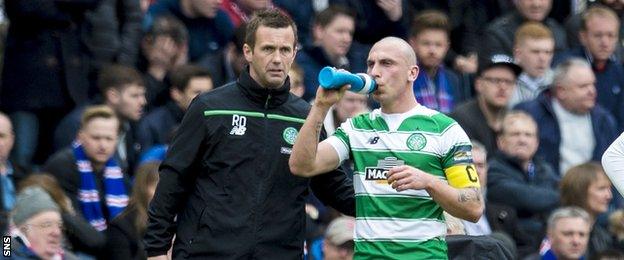
Celtic manager Ronny Deila (left) chats to his captain Scott Brown
In the aftermath, Warburton wished to put out the fire of expectation ahead of next season. He said that one result doesn't prove that his team are better than Celtic. On Sunday, they were. But over the course of the season? He knows that much has yet to be done.
He only had four out-field players on the bench for this semi-final. Resources are needed, for sure. Four or five first-team contenders at the right price, the continuation of his shrewd rebuild.
Warburton had some emotional moments when talking to the media after the full-time whistle, but he's a realist at heart. He has shown, in Hampden technicolour, that he has an eye for a player and the managerial nous to get the best out of his players. In quick order, he has instilled order and steel and enough quality to win a famous victory.
In McKay and Halliday you could see this day in microcosm. Highly motivated, hugely influential, unyielding in the face of supposedly superior opponents. It was a day for the Rangers players, Rangers manager and Rangers support. They told us they were back. They were right.
- Published17 April 2016
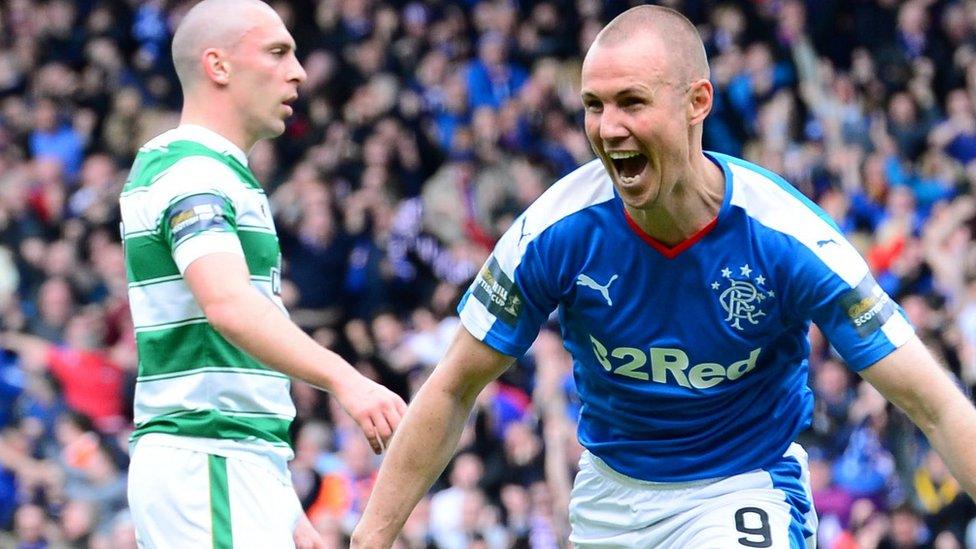
- Published17 April 2016
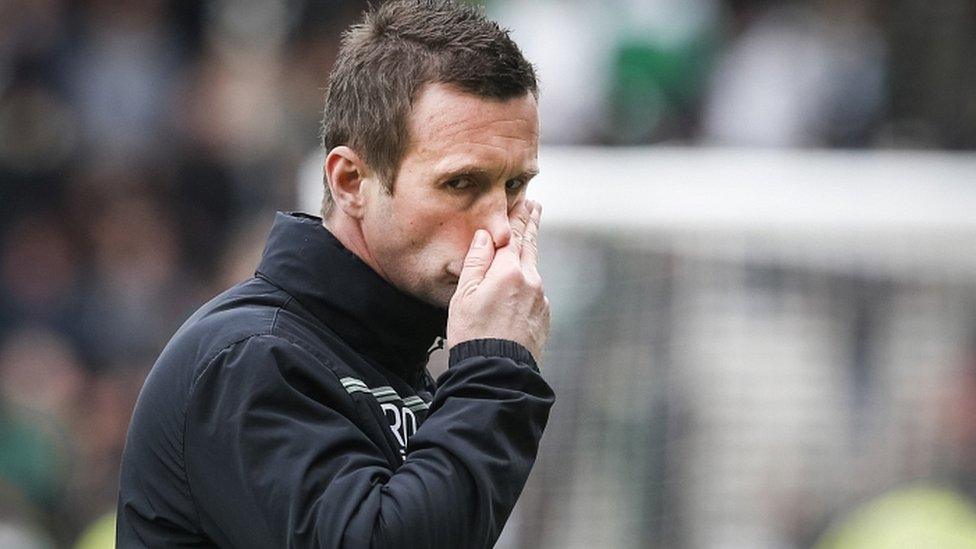
- Published17 April 2016
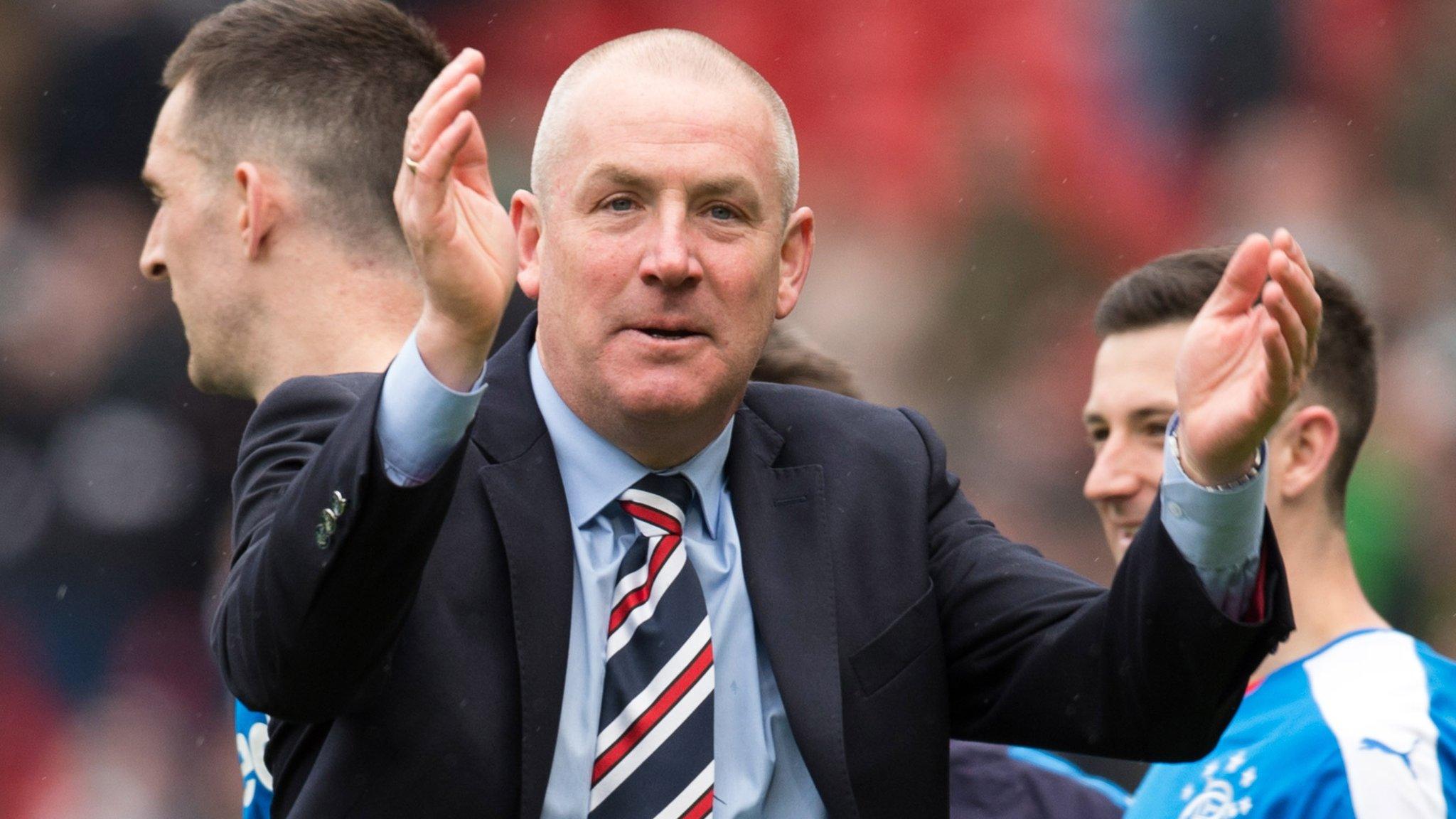
- Published17 April 2016
